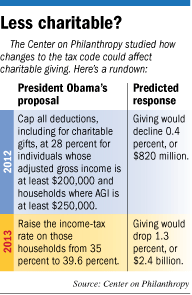Subscriber Benefit
As a subscriber you can listen to articles at work, in the car, or while you work out. Subscribe NowThe tax deduction for charitable donations is clearly a factor in giving.
Goodwill Industries’ drop-off centers are busier in December, and most charities see a flood of cash at the end of the year.
So it’s no surprise that not-for-profit-sector lobbyists are fighting President Obama’s proposal to limit that deduction. Yet some local fundraisers who could be affected by it aren’t concerned. And a new study by Indiana University’s Center on Philanthropy finds that the impact on giving would be modest—less than 1 percent in the first year and 1.3 percent when combined with a tax hike on the wealthy.
“Most people who make significant gifts don’t do it for the tax deduction. They do it for the mission of the organization, their affinity for it,” said Ernest Vargo, a longtime local fundraising consultant and president of the Eskenazi Health Foundation, which is trying to raise $75 million for a new Wishard Hospital.
Obama wants to cap deductions of all kinds at 28 percent for individuals earning $200,000 or more and families earning at least $250,000. Currently, those taxpayers can claim a deduction of 35 cents on the dollar for charitable gifts, plus mortgage interest and other expenses that qualify.
The top-tier taxpayers account disproportionately for all charitable giving, which was $290 billion in 2010, and they give most heavily to education, health care and the arts. Even so, Central Indiana Community Foundation chief Brian Payne shrugs off the potential hit to donations.
“I’m not freaked out by it,” he said.
In fact, Payne thinks the not-for-profit sector should contribute to reducing the national debt.
“It’s our mission to care about society,” he said. “We need more revenue. That ‘me first’ [mentality]—that’s how we got into this problem.”
Gene Tempel, president of the $1.2 billion IU Foundation, is concerned. Limiting the charitable deduction would raise the “cost” of giving, which gets more consideration when people pledge hundreds of thousands or millions of dollars, he said.
That threatens education, where wealthy people direct 27 percent of their giving, as well as other sectors, he said.
“The cost of giving does matter,” Tempel said. “It has an impact on the size of gifts and the timing of gifts.”
Dollar-value estimates of the impact of limitations on giving vary widely. The Independent Sector, which lobbies on behalf of 600 national charities and foundations, says donations would drop by $7 billion. The Center on Philanthropy’s study, released Oct. 26, found that, by itself, the cap on deductions would cause giving to fall just $820 million.
It all depends on how much an economist thinks donors will respond to changes in tax policy, said Una Osilli, director of research at the Center on Philanthropy. The center’s research for the annual Giving USA estimate of total philanthropy shows that the state of the economy and personal incomes carry the most weight.
That’s why overall giving saw its greatest declines in 40 years after the financial crisis of 2008, Osilli noted.
That’s not to say tax policy doesn’t matter. Giving fell dramatically in the wake of the Tax Reform Act of 1986, when the top income-tax rate dropped from 50 percent to 28 percent. People gave as much as they could before the change took effect in order to minimize their liability against the higher rate, Osilli said.
“After that, there really was not much of an impact,” she said. In fact, philanthropy entered a long period of expansion that lasted until 2008, she said.
 The Center on Philanthropy found that Obama’s plan to raise rates on top earners would be more harmful to giving than fiddling with deductions. The president wants to let the Bush tax cuts expire in 2013, raising the top marginal rate from 35 percent to 39.6 percent.
The Center on Philanthropy found that Obama’s plan to raise rates on top earners would be more harmful to giving than fiddling with deductions. The president wants to let the Bush tax cuts expire in 2013, raising the top marginal rate from 35 percent to 39.6 percent.
The tax hike alone would affect giving by about $1.3 billion, Osilli said. The combined effect of lower deductions, plus higher taxes, would cause giving to decline $2.43 billion in 2013. (The center came up with its projection by looking at what would have happened if the president’s plan took effect in 2009 and 2010.)
Although the center’s estimates are far from the $7 billion that national lobbyists predict, Osilli points out that the changes would come as charities are trying to dig out of the recession.
“This is a particularly vulnerable period for non-profits,” Osilli said.
Plus, she and national not-for-profit advocates noted, the charitable deduction is the one that rewards people for benefiting the public good.
This is not the first year Obama has gone after the charitable deduction. He eyed it as a way to pay for health care reform in the 2010 budget, and he introduced it in the 2011 budget for deficit reduction.
This year, it’s been on the table a number of times: as a fix for the alternative minimum tax, as a way to pay for Obama’s jobs act, and now as a recommendation to the Joint Select Committee on Deficit Reduction.
At a recent national conference on hospital fundraising, Vargo said the charitable-gift deduction was not central to the discussion. “It’s all about how [donors] feel about the economy,” he said.•
Please enable JavaScript to view this content.
